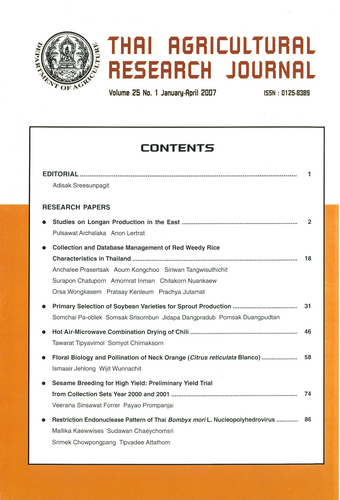Primary Selection of Soybean Varieties for Sprout Production
DOI:
https://doi.org/10.14456/thaidoa-agres.2007.4Keywords:
soybean, Glycine max, soybean sprout, sprout productionAbstract
The experiment was conducted in order to select appropriate soybean (Glycine max (L) Merrill) varieties for sprout production. Twenty soybean varieties were studied in rainy season at Chiang Mai Field Crops Research Centre during July and November 2004. The results showed that grain yield and seed yield of all vrieties were 165-371 and 72-325 kg/rai, respectively. After processing and storing at room temperature for three months during December 2004-March 2005, 250 g of soybean seeds of each varieties were sprouted by automatic sprouting machine for three days (65-72 hours.) The data of soybean sprout were averaged from four times of sprouting. There were ten varieties namely SJ 1, SJ 2, SJ 4, SJ 5, Sukhothai 1, Chiang Mai 2, Chakkrabhandhu No1, KKU 35, Rajamagala 1 and Khon Kean, showed high sprout yield and sprout index. The average fresh weight was 49.2 g/100 sprouts and the average sprout length was 9.24 cm (hypocotyl length 5.02 cm, root length 4.22 cm) with no lateral root. The average sprout diameter was 1.56 mm. The selected soybean varieties were small seed size and high seed germination. The average chemical compositions fo five varieties (SJ 4, SJ 5, Sukhothai 1, Chiang Mai 2 and Rejamagala 1) were 82.2% moisture content, 9.14% protein, 3.80 oil% 4.11 % carbohydrate, 0.73 % fiber, 34.1 mg/100g Ca and 1.69 mg/100g Fe. These ten selected varieties will be further studied for sprout yield after longer storage period.
Downloads
Published
How to Cite
Issue
Section
License
Copyright (c) 2017 วารสารวิชาการเกษตร (Thai Agricultural Research Journal)

This work is licensed under a Creative Commons Attribution-NonCommercial-NoDerivatives 4.0 International License.
Thai Agricultural Research Journal



